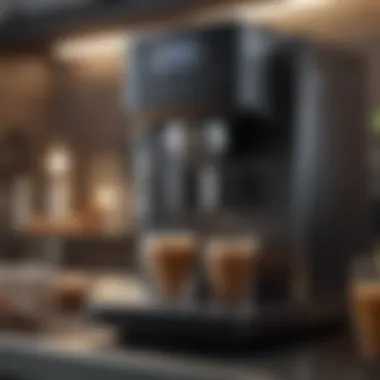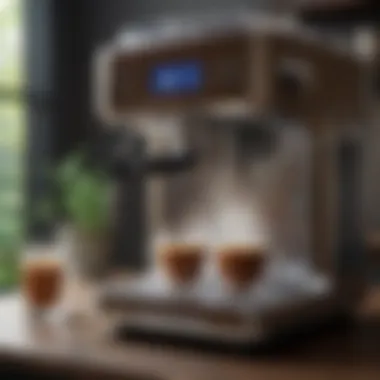Revolutionizing Coffee: The Rise of Futuristic Makers


Intro
The landscape of coffee brewing is undergoing a significant transformation. Traditional coffee makers are gradually being overshadowed by innovative devices that not only enhance the brewing process but also redefine user engagement with coffee. This article will explore the evolution of these futuristic coffee makers, shedding light on their design trends, technological advancements, and how they cater to the changing preferences of consumers.
Consumers today are looking for more than just a cup of coffee; they desire an experience. To understand this shift, we need to examine the key features that differentiate modern coffee makers from their conventional counterparts. Beyond aesthetics, sustainability and efficiency have become pivotal in shaping the future of coffee equipment.
By digging deeper into the multifaceted realm of futuristic coffee makers, we aim to provide a comprehensive perspective. We will cover various aspects starting from design trends to consumer preferences and the innovations that contribute to sustainability. It is vital for homeowners, interior design enthusiasts, party hosts, and gardening aficionados to grasp the evolving landscape of brewing apparatuses to make informed choices that align with their lifestyle and values.
With the stage set, let’s delve into the Design Trends that are at the forefront of this brewing disruption.
Preamble to Futuristic Coffee Makers
The realm of coffee brewing is undergoing a profound transformation driven by technological advancements and consumer preferences. Futuristic coffee makers are not merely gadgets; they are designed to enhance the coffee experience, making it more efficient and tailored to individual tastes. This article seeks to guide readers through the intricate landscape of these innovative devices. Understanding their features and how they differ from traditional coffee makers is essential to appreciating the future of brewing.
Defining Futuristic Coffee Makers
Futuristic coffee makers can be defined as appliances that incorporate advanced technologies to improve the brewing process. These makers integrate features like smart technology, app connectivity, and precision controls. They cater to a new generation of coffee enthusiasts seeking convenience without sacrificing quality. A core attribute of these devices is their ability to customize brewing parameters, allowing users to explore a variety of flavors and strengths. This definition extends to machines that also focus on sustainability, using eco-friendly materials and methods to reduce waste.
The Evolution of Coffee Brewing
The journey of coffee brewing is rich and varied, evolving significantly over centuries. Early methods involved boiling ground coffee in water, often resulting in bitter tastes and uneven flavors. The introduction of drip brewing in the 20th century marked a pivotal shift, emphasizing precision and consistency. As technology advanced, espresso machines emerged, appealing to those preferring a strong coffee experience.
Recently, the rise of single-serve machines, like Keurig and Nespresso, revolutionized convenience in brewing. However, these innovations often came with compromise on flavor quality. Today’s futuristic coffee makers signify a new chapter that combines both technology and taste. With features like smart sensors that optimize brewing time and temperature, they promise a better cup every time.
"Understanding the evolution of coffee brewing is crucial to grasping the significance of modern innovations."
In summary, futuristic coffee makers represent a disruption in brewing that marries technology with craftsmanship. As consumers become more discerning, the demand for superior coffee experience rises, prompting innovations that continue to shape how coffee is brewed, enjoyed, and shared.
The integration of these contemporary concepts will be explored further in the sections that follow, focusing on technological advancements, design trends, and sustainability considerations.
Technological Advancements in Coffee Makers
The realm of coffee brewing is undergoing a significant transformation, fueled by innovative technological advancements. These improvements are not merely embellishments but foundational changes that enhance the brewing experience. As homeowners and coffee enthusiasts seek perfection in every cup, understanding these advancements becomes crucial. Technologies such as smart brewing technology, app integration, and precision temperature control are essential for anyone looking to elevate their coffee experience.
Smart Brewing Technology
Smart brewing technology introduces automation into the coffee making process. These coffee makers often come equipped with sensors and algorithms that optimize brewing time and extraction. Brew time and techniques can be adjusted with just a tap on a smartphone or via voice command. This level of control appeals to those who value consistency in flavor. Moreover, these machines learn from user habits. They can suggest the best settings based on previous preferences. This personalization not only enhances the experience but also builds a relationship between the user and the machine. Such technology represents a step forward, ensuring that every cup is as expected, reducing the risk of human error during brewing.
App Integration and Connectivity
App integration is another remarkable feature in futuristic coffee makers. Many devices connect with dedicated mobile applications. This connectivity allows users to control brewing from anywhere in the home. With a few clicks on their smartphones, individuals can start their coffee maker, set schedules, or adjust preferences. This convenience appeals to busy homeowners and party hosts alike. They can have their coffee ready when needed, without being physically present. Additionally, these apps often provide tutorials and recipes. This is especially valuable for those who wish to experiment with different brewing styles. Connectivity through platforms like Reddit can also foster a community of coffee lovers sharing experiences and tips.
Precision Temperature Control


Precision temperature control is another key advancement. Consistency in temperature is critical for brewing great coffee. When water temperature varies, it can significantly affect extraction, leading to bitter or weak flavors. Many modern machines now incorporate precise heating elements. These ensure that water reaches the optimal brewing temperature. Users can often set specific temperatures for different coffee types, which can enlighten their coffee experience. This capability appeals to the gourmet coffee enthusiast who seeks to explore the nuances in flavor brought about by subtle changes in water temperature. This level of customization showcases the machine’s capacity to adapt, enabling each user to discover their ideal brew.
"Technological advancements in coffee makers not only enhance brewing quality but also redefine the user experience in the home."
In summary, the advancements in coffee maker technology mark a significant shift in how coffee is prepared and enjoyed. They enhance convenience, consistency, and customization, making the daily ritual of brewing coffee more enjoyable. As innovation continues, these machines further bridge the gap between traditional brewing and modern convenience.
Design Trends in Futuristic Coffee Makers
Design trends play a crucial role in the evolution of coffee makers. As homeowners and coffee enthusiasts seek devices that blend functionality with style, the design aspect becomes more significant. Futuristic coffee makers not only focus on brewing excellence but also cater to aesthetic sensibilities. This section explores key design trends such as minimalism, sustainability, and compactness, which collectively redefine the coffee experience.
Minimalistic Aesthetic
The minimalistic aesthetic is a prominent design trend in futuristic coffee makers. This trend is characterized by clean lines, simple shapes, and an overall uncluttered look. Consumers today favor appliances that do not overwhelm their kitchen decor. A minimalistic coffee maker can seamlessly integrate into one's environment, enhancing the kitchen's appearance without becoming an eyesore.
Some of the benefits of minimalistic design include:
- Ease of Use: Fewer buttons and controls make it easier for users to operate.
- Visual Clarity: A simple design reduces distractions, allowing users to focus on the brewing process.
- Versatility: Minimalist coffee makers suit diverse interior styles, from modern to traditional.
This design approach does not compromise on functionality. Many minimalist coffee makers still incorporate advanced brewing technology, thus ensuring excellent coffee quality.
Sustainable Materials
As environmental concerns rise, the use of sustainable materials in coffee maker design has gained importance. Many modern coffee makers are being crafted using eco-friendly substances, such as recycled plastics or responsibly sourced metals. These materials not only minimize environmental impact but also attract consumers who prioritize sustainability in their purchasing decisions.
Considerations about sustainable materials include:
- Durability: Eco-friendly materials can be just as durable as traditional ones, ensuring long product life.
- Recyclability: Many sustainable materials can be recycled, reducing waste.
- Consumer Demand: Increased awareness of environmental issues drives demand for products that reflect those values.
By choosing sustainable coffee makers, consumers contribute to a larger movement towards sustainable living and environmentally conscious choices.
Compact and Modular Designs
Compact and modular designs represent yet another critical trend in futuristic coffee makers. Limited kitchen space is a common challenge, particularly for urban dwellers. Therefore, coffee makers that are compact and easy to store have become essential. These designs often feature a modular approach that allows users to customize their devices according to specific needs.
Some notable advantages of compact and modular designs are:
- Space-Saving: Smaller coffee makers fit easily on countertops or in cabinets, maximizing available space.
- Customization: Modular systems allow for upgrades or configuration changes based on user preference.
- Portability: Many compact models are lightweight, making them easy to transport for gatherings or trips.
The combination of these design trends results in coffee makers that not only perform exceptionally but also meet the practical needs of consumers, reinforcing the message that style and substance can coexist in today's coffee brewing landscape.
Consumer Preferences and Trends
Understanding consumer preferences and trends is crucial in the context of futuristic coffee makers. The transformation of the coffee brewing landscape largely hinges on what modern coffee lovers seek in their daily brew. This section highlights specific elements that impact consumer choices, focusing on customization, user experience, and the rise of gourmet coffee.


Customization Features
Customization is a significant aspect driving consumer interest in innovative coffee makers. Today’s users desire products that can adapt to their specific tastes and lifestyles. Most modern coffee makers provide a myriad of options, allowing users to choose everything from coffee strength to brew temperature.
Potential buyers can appreciate machines that let them create individual profiles, tailoring beverage preferences for all household members. Brands like Breville and Keurig have designed models that address diverse user needs effectively, with programmable features and multiple brewing styles. This level of personalization enhances user engagement and satisfaction, making the experience feel more intimate and deliberate.
Customization transforms coffee making into an art rather than a mere routine.
User Experience Insights
Evolving technologies shape how consumers interact with coffee makers. User experience insights focus on design usability, interface simplicity, and overall satisfaction. Modern coffee makers often boast intuitive touchscreens, which minimize the technical barriers that might intimidate less tech-savvy consumers. The user should feel in control, and a seamless experience adds value to the product.
Feedback from end users illustrates a desire for simplicity paired with advanced functionality. For instance, machines that can be connected via Wi-Fi or mobile apps to schedule brews provide convenience. Customers favor these developments since they fit into their increasingly busy lives. Enhanced experiences lead to better customer satisfaction, ensuring brand loyalty in an ever-competitive market.
Gourmet Coffee Trends
The growing interest in gourmet coffee reflects a larger cultural shift towards quality over quantity. Consumers are more informed about various coffee origins, roast profiles, and brewing methods. This trend has led to a demand for coffee makers that support these gourmet aspirations, allowing users to experiment with different beans and techniques at home.
Many futuristic machines are compatible with specialty coffee pods or capable of hand brewing methods like pour-over or cold brew. Noteworthy brands like Nespresso offer machines that incorporate high-end technology to deliver barista-quality coffee. The inclination towards gourmet trends incentivizes manufacturers to innovate further, ensuring consumers continue to find unique and enjoyable options that match their sophisticated tastes.
The Impact of Sustainability
Sustainability is not just a current trend; it represents a fundamental shift in how we approach daily activities like brewing coffee. As consumers become more environmentally conscious, the coffee industry is evolving to meet their needs. This transition includes not only the materials used in coffee makers but also the overall energy efficiency of these devices. The importance of sustainable coffee makers lies in several key factors that contribute to an eco-friendlier future.
One significant aspect is the reduction of resources required for production and operation. Traditional coffee makers often use plastic components and excessive energy, which impact the environment negatively. By contrast, newer models are designed with sustainability in mind, using recyclable, biodegradable, or renewable materials. This not only decreases waste but also promotes a healthier planet.
Another consideration is the lifespan of the coffee maker. Sustainable designs often focus on durability, meaning they do not need frequent replacement. This longevity not only provides value for the consumer but also reduces the overall carbon footprint associated with manufacturing and shipping new devices annually.
In introducing these changes, consumers not only enjoy better products but are also playing a critical role in global sustainability efforts. By investing in eco-friendly options, they contribute to reducing pollution and conserving resources, fostering a more sustainable economy for future generations.
"Sustainable practices in coffee making show a commitment to protecting our environment while still enjoying quality coffee."
Eco-friendly Coffee Maker Options
When considering eco-friendly coffee makers, several options stand out. These devices go beyond just being energy-efficient; they integrate features that prioritize sustainable materials and construction processes.
- Brewista Smart Scale: This scale allows users to optimize their coffee brewing process. It minimizes waste by ensuring precise measurements of coffee and water.
- Ecolife Espresso Machine: Made from recycled aluminum, this machine offers a sleek design while being kind to the planet.
- Aeropress Coffee Maker: Lightweight and portable, the Aeropress uses less water and fewer resources than traditional methods without compromising quality.
Coffee makers with advanced technology often include features that support energy-saving measures, such as automatic shut-off and programmable settings. Such options ensure less electricity is consumed, further reinforcing their eco-friendly credentials.
Reducing Coffee Waste
Reducing coffee waste is critical in the quest for sustainable coffee brewing. Traditional coffee preparation methods often result in significant amounts of unused coffee grounds, filter waste, and energy consumption.


- Composting Coffee Grounds: Coffee grounds are nitrogen-rich and can be used in gardens as a natural fertilizer, helping reduce landfill waste and promote plant growth.
- Reusable Filters: Switch to permanent coffee filters made from stainless steel or cloth. They minimize the waste associated with single-use paper filters.
- Brew Just What You Need: Many modern coffee makers allow users to brew small, precise amounts tailored to their needs, preventing overproduction of coffee that may go uneaten.
This focus on reducing waste aligns with consumer values, catering to those who seek to lower their environmental impact through choices in their daily routines.
Future Perspectives on Coffee Brewing
The landscape of coffee brewing is undergoing a notable transformation. The integration of advanced technologies and shifting consumer demands sets a compelling stage for future developments in coffee makers. To understand these trends better, it is crucial to explore the technologies that are emerging and how they align with consumer expectations. This understanding will inform potential upgrades and innovations, ensuring manufacturers meet the needs of today's discerning coffee enthusiasts.
Emerging Technologies
Emerging technologies in the coffee brewing sphere are not merely enhancements but rather revolutions in how we perceive and prepare coffee. Many new devices are being designed with a strong focus on automation and artificial intelligence. These features can help in achieving customized brews with precision. For example, advanced sensors can measure variables like humidity and temperature, which directly influence flavor extraction.
Also, technologies such as IoT enable coffee makers to connect with smartphones and computers. Users can monitor and control the brewing process remotely, enhancing convenience and user experience. Not only do these advancements cater to the increasing desire for customization, but they also signify a shift toward a more efficient and hassle-free coffee brewing process.
Predicted Consumer Trends
As coffee culture evolves, consumers are looking for more than just quality; they are also seeking unique experiences. Several predicted trends indicate a growing appetite for specialized brewing methods, such as single-origin or pour-over techniques that emphasize rich flavors. Moreover, personalization will become central. Consumers want to adjust not only the coffee's strength but also brewing time and temperature to match their tastes.
There is also an ongoing trend towards sustainable practices. Customers are increasingly interested in how their coffee makers impact the environment, leading to a preference for brands that adopt eco-friendly materials and practices. This trend reflects a larger societal movement towards sustainability in various consumer products.
"The future of coffee brewing is not just in the cups we sip, but in the way those cups are made and the experiences they offer."
The Role of Artificial Intelligence
Artificial Intelligence is poised to play a significant role in the future of coffee brewing. With AI, coffee makers can learn from user preferences and adapt brewing parameters accordingly. For instance, a machine could analyze the user’s past brewing habits and suggest adjustments for a better flavor profile. This creates a tailored experience that traditional coffee makers simply cannot provide.
Additionally, AI can enable features such as voice activation and smart scheduling. Imagine prepping your morning coffee order via voice command the night before, waking up to the aroma of freshly brewed coffee, all without lifting a finger. This convenience coupled with personal touch transforms the mundane routine of brewing coffee into a sophisticated experience.
Artificial Intelligence not only improves customization but also enhances accessibility, making premium coffee experiences available to a wider audience.
In summary, the future perspectives on coffee brewing show an exciting intersection of technology and consumer needs. As home coffee makers become increasingly intelligent, they will redefine convenience and personal experience in coffee preparation.
Epilogue
In this section, we will reflect on the critical elements that have emerged around the discussion of futuristic coffee makers. This article emphasizes the transformation within the coffee brewing landscape and the importance of understanding how technology shapes our daily rituals. Through innovative features and eco-friendly designs, these devices not only enhance the coffee-making experience but also align with broader trends in sustainability and consumer preferences.
Summarizing Key Insights
A few key takeaways emerge from our exploration of futuristic coffee makers:
- Technological Integration: The incorporation of advanced technologies like smart brewing and temperature control signifies a shift towards precision in brewing methods. This allows for a more customizable experience, catering to the unique preferences of individual users.
- Design Trends: The move towards minimalistic and sustainable materials reflects the growing demand for products that not only serve a practical purpose but also fit into the aesthetic values of modern living spaces.
- Consumer Needs: Analyzing consumer insights reveals an increasing desire for customization and user experience enhancement. Today’s coffee drinkers seek not just functionality but also the ability to personalize their brewing process.
“The future of coffee making blends aesthetic value and innovative technology to redefine what brewing means in everyday life.”
The Future of Coffee Experience
Looking ahead, the coffee experience is poised for continued evolution. The advancements we see in futuristic coffee makers hint at several potential developments:
- Enhanced Connectivity: As home automation systems grow more sophisticated, expect coffee makers to seamlessly connect with other smart devices to create a fully synchronized environment for coffee preparation.
- Artificial Intelligence: The role of AI in coffee brewing can lead to machines that learn user preferences over time, optimizing brew settings for individual tastes without manual adjustments.
- Sustainability Focus: Future innovations will likely prioritize eco-conscious practices, with a focus on reducing waste and using sustainable materials in coffee maker production.















